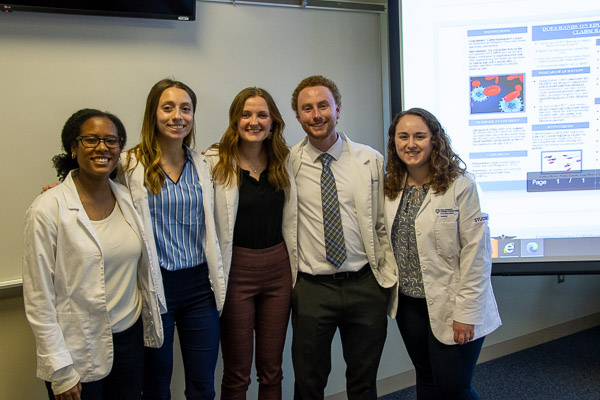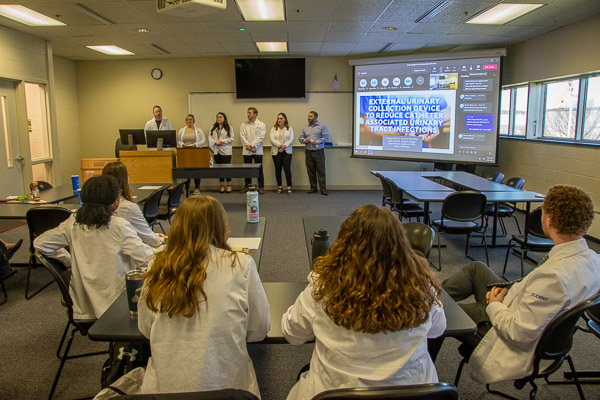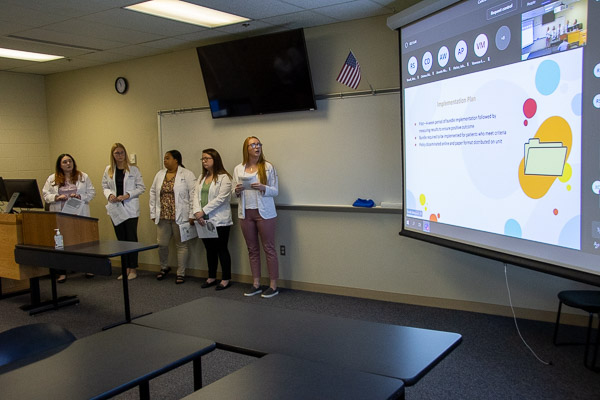A group of Pennsylvania College of Technology students took second-place honors for their research poster during the first Geisinger Nursing Student Scholarship Conference. The conference was initiated by faculty to help nursing students share their research.
Students Jenay Brown, of Williamsport; Connor J. Burke, of St. Clair; Emily L. Durbin, of Danville; Sydney E. Heiser, of Shamokin Dam; and Callie A. Sobolewski, of Budd Lake, N.J., were honored for their “Become a Master of Central Line Care” poster.
 Their research explored CLABSI, or central line-associated bloodstream infection. A central line is a tube (catheter) that doctors often place in a large vein in the neck, chest or groin to give medication or fluids or to collect blood for medical tests.
Their research explored CLABSI, or central line-associated bloodstream infection. A central line is a tube (catheter) that doctors often place in a large vein in the neck, chest or groin to give medication or fluids or to collect blood for medical tests.
The April 22 conference convened online, with students from Penn College, Bloomsburg University and Misericordia University presenting during the event’s morning session. In the afternoon, students from King’s College, Marywood University and Wilkes University presented their research and were likewise accorded first, second and third place.
Three Penn College groups, made up of senior students enrolled in a trio of nursing classes – Adult Health Nursing III, Leadership & Management in Nursing, and Research & Theory in Clinical Practice – presented their solutions to a problem or issue they observed during their clinical rotations in Adult Health Nursing III.
“As new on the unit, and having had some experience, the students ask themselves, with regard to some issue, ‘Why is that being done that way?’ or ‘Hmm, I didn’t think that was the way this should be.’ With that in mind, they create a research or evidence-based nursing question with which they work all semester, developing and refining,” explained Joni J. Pyle, associate professor of nursing.
In addition to the inquiry they conduct in the nursing research course, they examine, in their nursing leadership course, how they would create a change in practice that would better outcomes in some way.
 The result was a comprehensive presentation of both a problem and a potential solution, complete with cost analysis, potential risks with a change in practice, and strategies for implementation – including gaining buy-in from staff.
The result was a comprehensive presentation of both a problem and a potential solution, complete with cost analysis, potential risks with a change in practice, and strategies for implementation – including gaining buy-in from staff.
“This conference is a great way for the students to share their hard work and to possibly move the issue forward, via postgraduate engagement in nursing research at their chosen place of employment,” said Pyle, who helped to conceive the conference. “It helps students to realize that these assignments are not simply just an assignment, rather real-life nursing practice and its ability to change.”
Over the years, Pyle observed that students spend a semester creating research, but then graduate “and that is that!”
 “The need to disseminate this work was key,” Pyle said.
“The need to disseminate this work was key,” Pyle said.
She and Rebecca Stoudt, associate dean of nursing student education at Geisinger, discussed ways the students might share their findings. Stoudt contacted the other schools, judges were recruited, and the online conference was planned. The organizers hope that future conferences can be conducted in person.
Other Penn College student research topics were “External Urinary Collection to Reduce Catheter-Associated Urinary Tract Infections” and “The Effects of Prone Positioning in Acute Respiratory Distress Syndrome.”
Penn College offers six nursing degree options, including a master’s degree with a concentration in nursing education, traditional two- and four-year degrees for registered nursing preparation, and a two-year practical nursing degree, as well as pathways for licensed practical nurses to become RNs and for RNs with a diploma or associate degree to pursue a bachelor’s degree. It welcomes high school and transfer applicants for entry each semester.
For information about Penn College, a national leader in applied technology education, email the Admissions Office or call toll-free 800-367-9222.
Students Jenay Brown, of Williamsport; Connor J. Burke, of St. Clair; Emily L. Durbin, of Danville; Sydney E. Heiser, of Shamokin Dam; and Callie A. Sobolewski, of Budd Lake, N.J., were honored for their “Become a Master of Central Line Care” poster.
 Their research explored CLABSI, or central line-associated bloodstream infection. A central line is a tube (catheter) that doctors often place in a large vein in the neck, chest or groin to give medication or fluids or to collect blood for medical tests.
Their research explored CLABSI, or central line-associated bloodstream infection. A central line is a tube (catheter) that doctors often place in a large vein in the neck, chest or groin to give medication or fluids or to collect blood for medical tests.The April 22 conference convened online, with students from Penn College, Bloomsburg University and Misericordia University presenting during the event’s morning session. In the afternoon, students from King’s College, Marywood University and Wilkes University presented their research and were likewise accorded first, second and third place.
Three Penn College groups, made up of senior students enrolled in a trio of nursing classes – Adult Health Nursing III, Leadership & Management in Nursing, and Research & Theory in Clinical Practice – presented their solutions to a problem or issue they observed during their clinical rotations in Adult Health Nursing III.
“As new on the unit, and having had some experience, the students ask themselves, with regard to some issue, ‘Why is that being done that way?’ or ‘Hmm, I didn’t think that was the way this should be.’ With that in mind, they create a research or evidence-based nursing question with which they work all semester, developing and refining,” explained Joni J. Pyle, associate professor of nursing.
In addition to the inquiry they conduct in the nursing research course, they examine, in their nursing leadership course, how they would create a change in practice that would better outcomes in some way.
 The result was a comprehensive presentation of both a problem and a potential solution, complete with cost analysis, potential risks with a change in practice, and strategies for implementation – including gaining buy-in from staff.
The result was a comprehensive presentation of both a problem and a potential solution, complete with cost analysis, potential risks with a change in practice, and strategies for implementation – including gaining buy-in from staff.“This conference is a great way for the students to share their hard work and to possibly move the issue forward, via postgraduate engagement in nursing research at their chosen place of employment,” said Pyle, who helped to conceive the conference. “It helps students to realize that these assignments are not simply just an assignment, rather real-life nursing practice and its ability to change.”
Over the years, Pyle observed that students spend a semester creating research, but then graduate “and that is that!”
 “The need to disseminate this work was key,” Pyle said.
“The need to disseminate this work was key,” Pyle said.She and Rebecca Stoudt, associate dean of nursing student education at Geisinger, discussed ways the students might share their findings. Stoudt contacted the other schools, judges were recruited, and the online conference was planned. The organizers hope that future conferences can be conducted in person.
Other Penn College student research topics were “External Urinary Collection to Reduce Catheter-Associated Urinary Tract Infections” and “The Effects of Prone Positioning in Acute Respiratory Distress Syndrome.”
Penn College offers six nursing degree options, including a master’s degree with a concentration in nursing education, traditional two- and four-year degrees for registered nursing preparation, and a two-year practical nursing degree, as well as pathways for licensed practical nurses to become RNs and for RNs with a diploma or associate degree to pursue a bachelor’s degree. It welcomes high school and transfer applicants for entry each semester.
For information about Penn College, a national leader in applied technology education, email the Admissions Office or call toll-free 800-367-9222.
